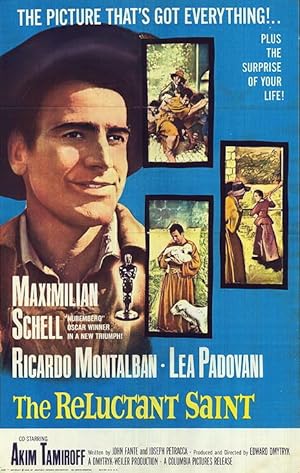
The Reluctant Saint Page #6
Synopsis: Joseph of Cupertino, a simple young man thought by many in his village to be an idiot, is pressured to enter a monastery. He does so, and surprises everyone by passing the entrance exam to study for the priesthood. But this is only the first of many surprises from the man who would become Saint Joseph Cupertino.
Director(s): Edward Dmytryk
Production: Davis
- NOT RATED
- Year:
- 1962
- 105 min
- 204 Views
Father Raspi is driving out the devil.
The devil? You?
Oh, no, you're a saint.
He's a saint.
Take this blasphemous fool
out of here.
Oh, no, no. One moment!
The Madonna.
lt's Father Giuseppe's.
Take him out.
Amen.
As of this moment, you are free.
You're no longer
possessed by the devil.
Now, let us leave Father Giuseppe
alone with his penance.
Father Raspi...
The chains...
No, Father Leo, the chains
will remain until morning.
Father Raspi.
Translation
Translate and read this script in other languages:
Select another language:
- - Select -
- 简体中文 (Chinese - Simplified)
- 繁體中文 (Chinese - Traditional)
- Español (Spanish)
- Esperanto (Esperanto)
- 日本語 (Japanese)
- Português (Portuguese)
- Deutsch (German)
- العربية (Arabic)
- Français (French)
- Русский (Russian)
- ಕನ್ನಡ (Kannada)
- 한국어 (Korean)
- עברית (Hebrew)
- Gaeilge (Irish)
- Українська (Ukrainian)
- اردو (Urdu)
- Magyar (Hungarian)
- मानक हिन्दी (Hindi)
- Indonesia (Indonesian)
- Italiano (Italian)
- தமிழ் (Tamil)
- Türkçe (Turkish)
- తెలుగు (Telugu)
- ภาษาไทย (Thai)
- Tiếng Việt (Vietnamese)
- Čeština (Czech)
- Polski (Polish)
- Bahasa Indonesia (Indonesian)
- Românește (Romanian)
- Nederlands (Dutch)
- Ελληνικά (Greek)
- Latinum (Latin)
- Svenska (Swedish)
- Dansk (Danish)
- Suomi (Finnish)
- فارسی (Persian)
- ייִדיש (Yiddish)
- հայերեն (Armenian)
- Norsk (Norwegian)
- English (English)
Citation
Use the citation below to add this screenplay to your bibliography:
Style:MLAChicagoAPA
"The Reluctant Saint" Scripts.com. STANDS4 LLC, 2025. Web. 9 Mar. 2025. <https://www.scripts.com/script/the_reluctant_saint_16762>.






Discuss this script with the community:
Report Comment
We're doing our best to make sure our content is useful, accurate and safe.
If by any chance you spot an inappropriate comment while navigating through our website please use this form to let us know, and we'll take care of it shortly.
Attachment
You need to be logged in to favorite.
Log In